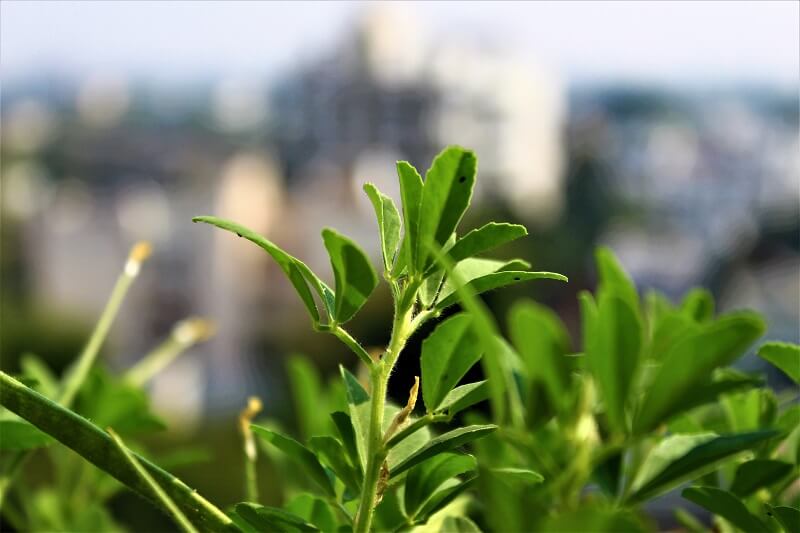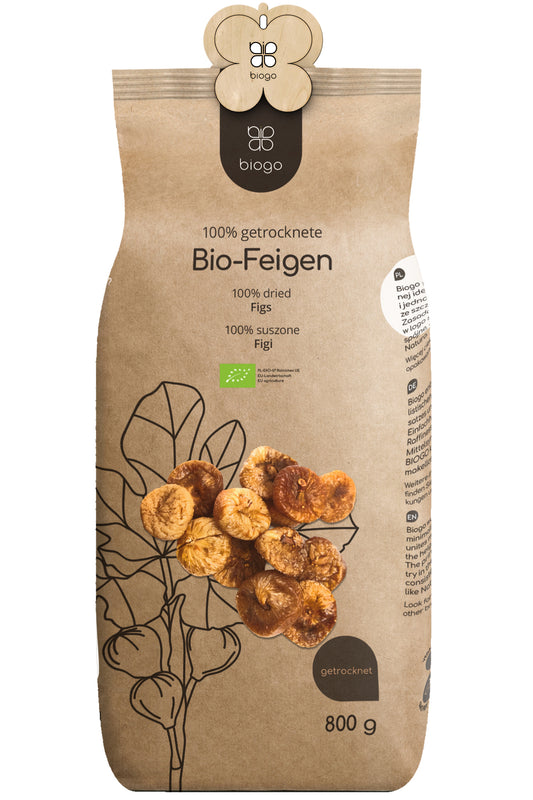CONTENTS
- Fenugreek – basic information
- Fenugreek – the nutritional content
- Fenugreek seeds lower cholesterol levels in the blood
- Fenugreek and diabetes
- Fenugreek for the digestive system
- Can fenugreek increase testosterone levels in men?
- Other uses of fenugreek
- Fenugreek – contraindications and use
- Summary
Fenugreek may not be as popular in our country as it is in Asia, but it's becoming increasingly popular every year. There's good reason for this: it's a highly versatile plant with many uses. It's proven that it has found its place not only in herbal medicine, but also in cosmetics and cooking—as a wonderful spice. It has been used for centuries in traditional Asian medicine, as well as in the Middle East. What can we gain from using fenugreek? We invite you to read on.
Fenugreek – basic information
Fenugreek isn't the only name for this plant. It's also called Greek clover or God's herb. It's a green plant similar to our native clover and belongs to the Fabaceae family. Its native habitat was Asia, but over time, it spread to Eastern Europe. In other regions, however, it's considered an imported species. However, this doesn't change the fact that it's now cultivated almost worldwide. Fenugreek fruits are long pods that emit a characteristic, slightly mild odor. Fenugreek seeds are used for medicinal purposes. For this purpose, a mature plant is cut, and then its fruits are threshed to obtain these seeds. They are used in traditional medicine to treat many illnesses. They are recommended for relieving the symptoms of diabetes, eye diseases, and various skin conditions.
Fenugreek – the nutritional content
Fenugreek seeds are a very good source of vitamin C, as well as vitamin B6, vitamin A, folic acid, and many minerals. These include calcium, iron, phosphorus, zinc, and sodium. They contain up to 30% mucilage, most of which is galactomannans, responsible for the many health-promoting properties of these seeds. They also contain a lot of fat, as well as proteins and essential oils. 100 grams of dry seeds contain about 330 kcal, a significant energy source. Like almost all plants, they also contain flavonoids (vitexin, isovitexin, and vicenin), various bitter compounds, alkaloids, and plant sterols. Fenugreek seed extracts can be used both externally and internally. However, numerous studies have shown that significantly better therapeutic effects are achieved when taken internally.
Fenugreek seeds lower cholesterol levels in the blood
Fenugreek seeds, or rather the oil extracted from them, can have a positive effect on our circulatory system . They can help lower total cholesterol, as well as LDL cholesterol, triglycerides, and VLDL (low-density lipoprotein) levels. All of these beneficial effects of fenugreek are possible thanks to the steroid saponins it contains. Their main function is to increase the rate of cholesterol metabolism in the liver. This converts excess cholesterol into bile acids, which are then excreted from the body. Furthermore, saponins can reduce the absorption of fats, which significantly contributes to reducing the risk of diseases such as arteriosclerosis, coronary heart disease, and heart attack.
Fenugreek and diabetes
We've already mentioned that fenugreek seeds contain up to 30% mucilage. This can be especially beneficial for diabetics and people who have problems with high blood sugar levels. Fenugreek seeds consumed before meals can slow the process of food emptying from the stomach. They also have an effect on lowering postprandial blood sugar levels. It's also worth noting that they can help reduce the activity of enzymes responsible for carbohydrate breakdown and reduce the amount of sugar excreted in the urine, thereby reducing the risk of glycosuria (glucosuria). Fenugreek can also lower blood sugar levels, again through another mechanism. 4-hydroxyisoleucine is an amino acid that acts on the pancreas and can induce insulin secretion. This effect is enhanced by a number of polyphenols, which in turn sensitize the tissue to the action of this insulin and thus make it even more effective.
Fenugreek for the digestive system
Fenugreek seeds can be an excellent addition to pharmacotherapy for many digestive system diseases, but not only. For example, water extracts from fenugreek seeds are used as an aid for stomach ulcers. This is all due to the presence of polysaccharide fractions, which act as fiber. Once they enter the stomach, they form a protective layer for the inflamed gastric mucosa. They protect against the corrosive effects of hydrochloric acid and pepsin, thus facilitating faster recovery. Fenugreek seeds also perfectly improve digestion. The substances they contain can increase the secretion of gastric juice, bile, and saliva. They also stimulate the appetite, making them recommended even for picky eaters. Thanks to their fiber content, they accelerate the movement of food through the intestines and also increase peristalsis, thereby reducing constipation. Interestingly, the seeds of this plant can be successfully used to support the treatment of hemorrhoids. They contain flavonoids that increase the strength of blood vessel walls and can help seal them. Fenugreek can also support liver function. It has a hepatoprotective effect that is no different from that of silymarin. It is an antioxidant commonly used in various liver diseases. It has anti-inflammatory effects, inhibiting the excessive penetration of toxic substances into the organ, and also preventing fibrosis.
Can fenugreek increase testosterone levels in men?
According to recent reports, fenugreek can influence testosterone levels and reduce excess body fat. This study was conducted in 2010 by researchers at Baylor University. In the study, young men (primarily those who worked out in the gym) were given 500 mg of fenugreek extract daily. They then trained with weights four days a week. The research was conducted over a period of two months, and the results were compiled afterward. It has been shown that fenugreek can significantly reduce the amount of body fat and increase testosterone levels. Interestingly, its effect on muscle strength and endurance was described as negligible.
Other uses of fenugreek
Fenugreek seeds also act as a natural expectorant, anti-inflammatory, and analgesic. This makes them ideal for use on an ad hoc basis for colds and flu. Interestingly, they can act similarly to the antibiotics we know. Fenugreek extracts are proven to be a useful complement to standard antibiotic therapy, particularly for infections caused by Staphylococcus aureus, E. coli, pneumonia, and Salmonella. Furthermore, compresses made from the seeds of this plant can be helpful for various injuries and skin conditions. They act as a remedy for abscesses, bruises, boils, and even ulcers. It's also worth mentioning that fenugreek also increases lactation. This is certainly important for women who struggle with malnutrition.
Fenugreek – contraindications and use
There are virtually no contraindications to the use of fenugreek seeds . The only thing to be careful about is the dosage, because, as with anything, overdose is possible. As for the use, it all depends on how you intend to use it. If you choose external application, a fenugreek seed compress is best. Mix 50 to 100 g of powdered seeds with water in a ratio that forms a thick paste. Then add about half a teaspoon of ordinary vinegar. Apply the prepared paste to the target area. For internal use, raw, powdered seeds are best. To facilitate consumption, you can add jam or honey. It is important that the proportions are 1:1. Fenugreek prepared in this way can be consumed twice a day, one teaspoon at a time with a meal.
Summary
Fenugreek is a truly interesting plant. Its high level of safety also speaks for itself. It's not only worth using for various skin conditions. It has a beneficial effect on the digestive and circulatory systems, and diabetics should also consider using it. Despite its relatively low popularity in Poland, it is still grown. Thanks to its distinctive bitter flavor, it also makes a great culinary spice.
THE PUBLISHER'S CHOICE
Dried dates 1 kg BIOGO
- €4,21
€4,95- €4,21
- Unit price
- / per
Almonds 1 kg BIOGO
- €11,69
€13,75- €11,69
- Unit price
- / per
Peeled sunflower seeds 1 kg BIOGO
- €3,04
€3,57- €3,04
- Unit price
- / per
Dried organic mango 400 g BIOGO
- €10,99
- €10,99
- Unit price
- / per
Dried White Mulberries 500 g ORGANIC
- €5,84
€6,87- €5,84
- Unit price
- / per
Popcorn (corn kernels) organic 1 kg BIOGO
- €5,84
- €5,84
- Unit price
- / per
Organic Ground Turmeric 500 g BIOGO
- €5,92
- €5,92
- Unit price
- / per
Organic cashew nuts 1 kg BIOGO
- €19,99
- €19,99
- Unit price
- / per
Milk thistle seeds 1 kg BIOGO
- €3,99
- €3,99
- Unit price
- / per
Dried organic figs 800 g BIOGO
- €30,12
- €30,12
- Unit price
- / per







































































































































